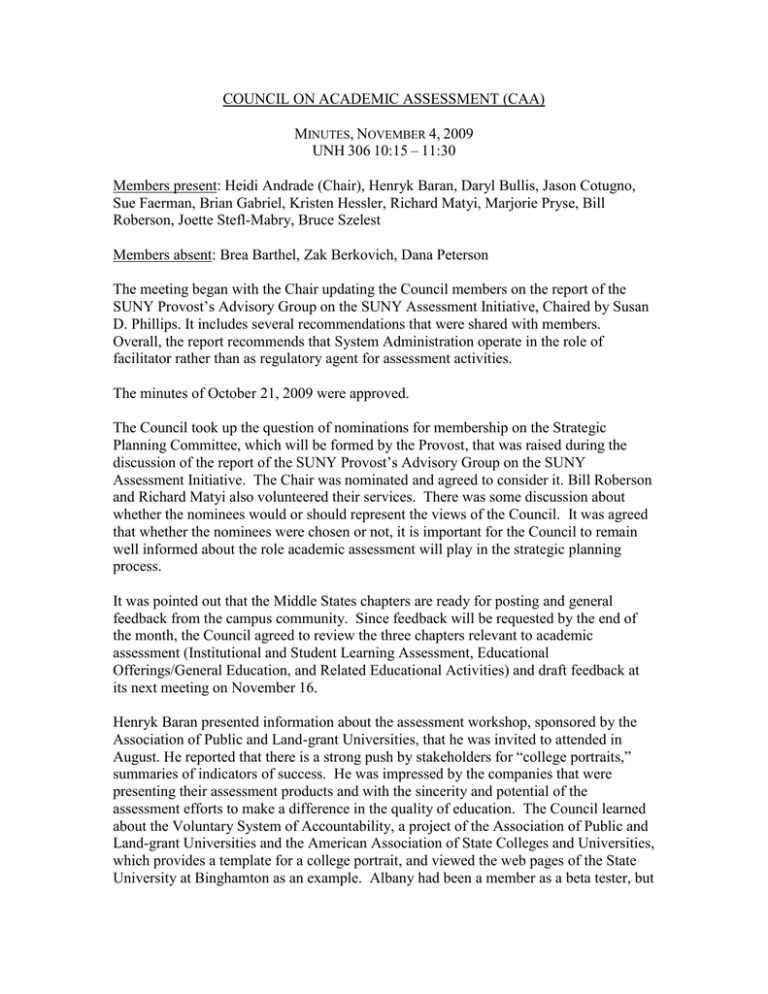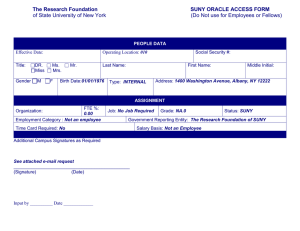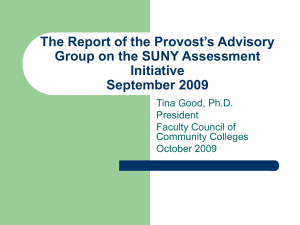November 4, 2009
advertisement

COUNCIL ON ACADEMIC ASSESSMENT (CAA) MINUTES, NOVEMBER 4, 2009 UNH 306 10:15 – 11:30 Members present: Heidi Andrade (Chair), Henryk Baran, Daryl Bullis, Jason Cotugno, Sue Faerman, Brian Gabriel, Kristen Hessler, Richard Matyi, Marjorie Pryse, Bill Roberson, Joette Stefl-Mabry, Bruce Szelest Members absent: Brea Barthel, Zak Berkovich, Dana Peterson The meeting began with the Chair updating the Council members on the report of the SUNY Provost’s Advisory Group on the SUNY Assessment Initiative, Chaired by Susan D. Phillips. It includes several recommendations that were shared with members. Overall, the report recommends that System Administration operate in the role of facilitator rather than as regulatory agent for assessment activities. The minutes of October 21, 2009 were approved. The Council took up the question of nominations for membership on the Strategic Planning Committee, which will be formed by the Provost, that was raised during the discussion of the report of the SUNY Provost’s Advisory Group on the SUNY Assessment Initiative. The Chair was nominated and agreed to consider it. Bill Roberson and Richard Matyi also volunteered their services. There was some discussion about whether the nominees would or should represent the views of the Council. It was agreed that whether the nominees were chosen or not, it is important for the Council to remain well informed about the role academic assessment will play in the strategic planning process. It was pointed out that the Middle States chapters are ready for posting and general feedback from the campus community. Since feedback will be requested by the end of the month, the Council agreed to review the three chapters relevant to academic assessment (Institutional and Student Learning Assessment, Educational Offerings/General Education, and Related Educational Activities) and draft feedback at its next meeting on November 16. Henryk Baran presented information about the assessment workshop, sponsored by the Association of Public and Land-grant Universities, that he was invited to attended in August. He reported that there is a strong push by stakeholders for “college portraits,” summaries of indicators of success. He was impressed by the companies that were presenting their assessment products and with the sincerity and potential of the assessment efforts to make a difference in the quality of education. The Council learned about the Voluntary System of Accountability, a project of the Association of Public and Land-grant Universities and the American Association of State Colleges and Universities, which provides a template for a college portrait, and viewed the web pages of the State University at Binghamton as an example. Albany had been a member as a beta tester, but had withdrawn over concerns about how value-added testing was being reported. Council members indicated their interest in being informed about any discussions that may arise pertaining to Albany’s potential participation in VSA. The Student Learning Outcomes Rubric was then reviewed by the Council. Members agreed on its usefulness for department Chairs and faculty, and offered several suggestions for clarification of its content. The Chair concluded the meeting by asking members to bring their suggestions for incentivizing the further refinement of assessment plans to the next meeting, and requested that Bendikas forward the broadcast email about the Middle States chapters to the CAA members as a reminder to read and prepare feedback on the three chapters related to academic assessment. The meeting adjourned at 11:30 a.m. Minutes respectfully submitted by Kristina Bendikas

